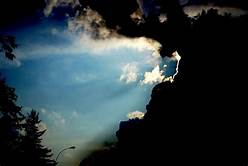Torah Reflections
Divrei Torah by Rabba Kaya Stern-Kaufman
 Darkness comes in many forms; physical darkness, emotional darkness, intellectual darkness and spiritual darkness. Our festival of Chanukah was established at the darkest time of the year. In December we encounter the shortest day, a day with the least sunshine of the entire year. And as Chanukah begins on the 25th day of the lunar month, during the waning moon cycle, the nights are also their darkest. At this time of year when we turn inward, when cold and darkness are abundant, the Rabbis, created this festival of light, as if, in answer to our yearning for light and warmth. The beauty of the Jewish calendar reveals the ever-changing nature of life and gives us spiritual tools to navigate these changes. In the winter season of shortened daylight, lest we fall into despair, we kindle lights for eight nights. We are reminded that the light is returning, that the light in fact, always returns. We nurture an attitude of trust in the returning light even when there is an abundance of apparent darkness. Unlike all biblically-based holidays, there is no Havdalah, no ritual of separation to divide between Chanukah and the rest of the year. Rabbi Dovber Pinson teaches that this is because spiritual light and the quality of trust are always available to us at any time, in any day, week or year. At Chanukah, in particular, we are reminded of the spiritual power of trust. We are nourished on the story of a small band of people and a small cruise of oil that defied the odds and restored light within the apparent darkness of that time. It was through the Maccabees trust in their spiritual mission that they persisted and were victorious. Alan Morinis describes the quality of bitachon/trust in this way: Bitachon gives us the capacity to act fearlessly. A heart cannot hold both fear and trust at the same time. When we cultivate trust, we inevitably loosen the grip fear holds on our heart. Living with a sense of trust in the unfolding of life’s events, allows us to become fearless and loving human beings. Bitachon is the inner attitude that respects that whatever is happening in our lives is nothing more or less than the curriculum given to us, that brings us to the threshold of growth that we would likely never otherwise approach. As we read the continuing story of Joseph in the Torah this week, we see the evolution of his character into one who has come to trust in the unfolding of his destiny. Despite the pain of his situation, his exile from his family, his long imprisonment, Joseph displays an attitude of trust that all of his hardships were ultimately for a higher good. And it is this quality that will allow him to forgive his brothers and achieve peace, finally, peace in their family. Joseph expresses trust in the unfolding of a plan that is greater than himself or any of the other players. Somehow, from the dungeon of his experience he has come to trust in the presence of the Divine in the unfolding of his life and the circumstances around him. Trust is one of Joseph’s great teachings - not blind trust or passivity that relinquishes responsibility, but rather, trust as a foundation from which one can act with intent and purpose. It is Joseph’s inner quality of bitachon/trust that makes it possible to perceive the deeper truth of plenty in the face of scarcity. Joseph will interpret Pharaoh’s two dreams as one in the same. There will be seven years of plenty followed by seven years of famine, but Joseph will supply the solution to the years of famine. By storing up the grain in the years of plenty, there will be enough to feed the people in the years of famine. Joseph is able to see that even in times of scarcity there can still be abundance. It is the faculty of trust in G-d, trust in the ever-changing nature of life and trust in the goodness of this world that allows his vision to expand. He can see what others cannot and it is through his expanded vision that he can create and execute a successful plan for redemption. In Hebrew the word bitachon means trust but it also means security, for true security is ultimately a state of mind, a state of being. As we light the Chanukah candles this year, as we move more deeply into this season of winter, let us try to cultivate the quality of trust. May we find in our challenges, whether personal or collective, an opportunity to stretch ourselves a little bit further. The constriction of fear is lifted through the expansion of trust. Then, our vision can broaden and solutions, otherwise hidden will inevitably appear. May it be so. Comments are closed.
|
Rabba Kaya Stern-KaufmanRabba Kaya served as Interim Rabbi of RJC from October 2017 through June 2019.
More about Rabba Kaya Archives
July 2019
|
OFFICE Hours
|
Telephone802-773-3455
|
Email ADDRESS |
